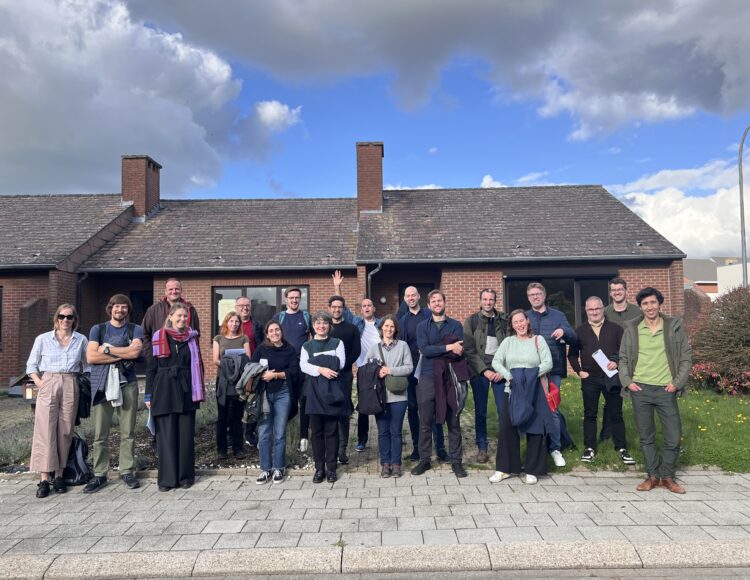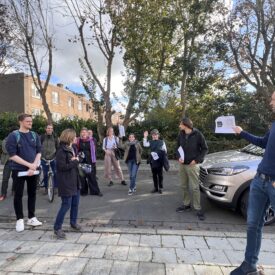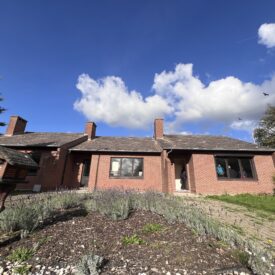Social and cooperative housing providers are mobilising to tackle energy poverty head-on through the new SOCIALNRG project, an EU-funded initiative coordinated by Housing Europe. With a goal to create long-lasting energy communities for 460 families, SOCIALNRG is bringing together organisations from our sector operating in Belgium, Italy, and Slovenia to support low-income residents amid soaring energy costs.
With one in ten Europeans struggling to pay energy bills (Eurostat, 2024), SOCIALNRG’s mission to provide affordable energy is pressing. Social housing operators in multiple regions are rolling out demo sites to make renewable energy a reality for vulnerable households.
Renewing communities with renewable energy
In Belgium’s Mechelen, Woonland, a social housing provider, has started retrofitting the 1970s-built Kriekenijvelden neighbourhood, translated from Dutch as “Cherry Fields,” to replace outdated and unfit for living homes with a fossil-free apartment block and houses. But the ambition goes further: the SOCIALNRG project will study the feasibility of a district heating network that could help the entire community switch from gas to geothermal energy. If viable, 71 social housing units and some of the 78 surrounding private homes could be connected to this network, helping the city meet its ambitious 40-50% CO2 reduction target by 2030.
Near Milan, Italy, the very densely populated and economically vulnerable Cinisello Balsamo is also getting a green makeover. Finabita, one of Italy’s largest housing cooperatives, is turning to solar power, installing photovoltaic panels on rooftops to cut residents’ bills and give them a say in managing their own energy use. The project is designed to foster community participation in energy governance, making the European Union’s ambition a reality for active players in their energy transition.
Meanwhile, in Ravne na Koroškem, Slovenia, a town built on a steelworking legacy, social housing provider Stanovanjsko podjetje (STAN) is already rolling out deep renovations, such as prefabricated facades, heat pumps, and self-shading windows for medium-sized multi-apartment buildings. With the support of SOCIALNRG, STAN would like to see housing residents who rely on modest incomes or social support to get a chance to tap into sustainable energy and feel less overburdened.
Housing Europe: bridging local energy poverty eradication and EU ambitions
Through the coordination of this three-year project, Housing Europe will continue to push beyond the provision of affordable housing to focus on social cohesion and innovation in sustainable renovation, redefining public, cooperative, and social housing as a testing ground for climate solutions. With a network of over 43,000 housing providers, we advocate for a fair and inclusive transposition of just transition policies to tackle the housing challenges facing local communities. In the face of a democratic backlash often characterised by “Not In My Backyard” (NIMBY) resistance, Housing Europe will undertake the crucial task of evaluating the three pilot projects, setting benchmarks, leading the communication strategy for SOCIALNRG, and ensuring the long-term sustainability and replication of successful outcomes in another 9 European countries.
SOCIALNRG is also partnering with academia, including the Institute for Innovation and Development of University of Ljubljana (IRI UL), to measure household attitudes toward energy poverty and energy community participation. Through workshops, sensory walks, and interviews, IRI UL will gather data that will shape the energy communities. The Slovenian pilot will also be supported by FOCUS, a local association active in climate change and global responsibility. In Mechelen, Woonland will rely on the specific knowledge of KLIMAAN, while Italy’s FINABITA will be backed up by ENOSTRA. In Brussels, Housing Europe will also work closely with REScoop.eu which has solid experience in overcoming energy cooperative hurdles.
For cities like Mechelen, projects like these are more than just pilot schemes. As the city aims to connect 1,400 homes to renewable heating by 2025, its approach is seen as a model for how localised energy solutions can drive down emissions while protecting low-income households.
SOCIALNRG is funded by the EU Life Programme.
The project has started in October 2024 and will run until September 2027.


